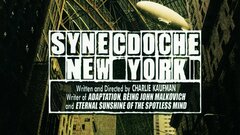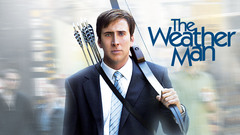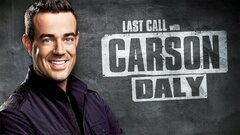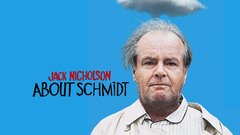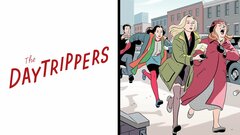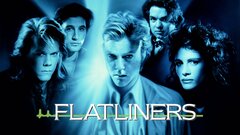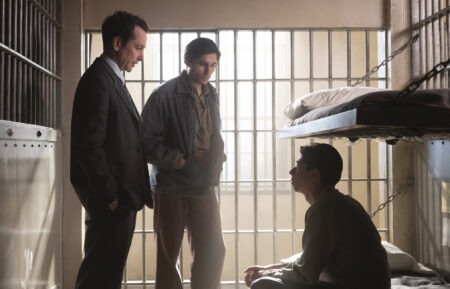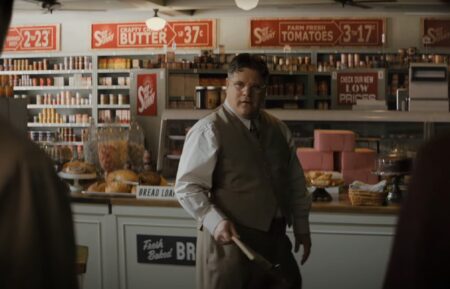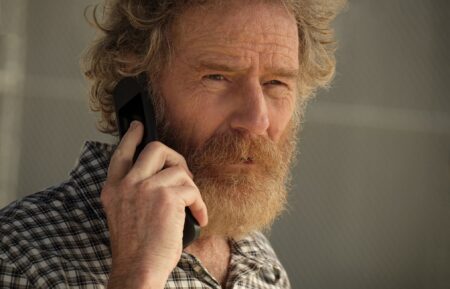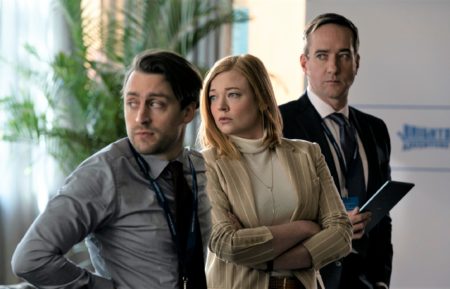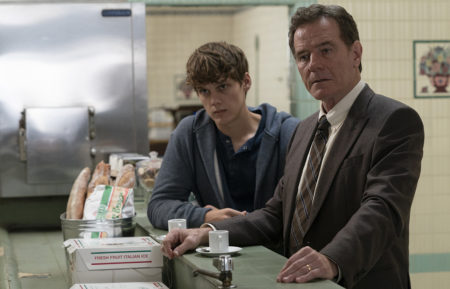A dramatic actress of film and stage whose quiet exterior belied her intensity, Hope Davis excelled in both supporting and leading roles, bringing strength to numerous independent films like "The Daytrippers" (1996), "Next Stop Wonderland" (1998), "About Schmidt" (2002) and "American Splendor" (2003). A veteran of the Chicago theater scene, she made her feature debut in "Flatliners" (1990) and slowly worked her way up the ranks to major roles, wowing audiences and critics alike with her versatility. In "The Daytrippers," she was cast as an embittered housewife who sets out on an interstate journey with her family to discover if her husband is cheating on her, while "Wonderland" showed her skill with gentle romantic comedy.
Meanwhile, her Hollywood efforts, including "Arlington Road" (1999) and "The Weather Man" (2005), tended to shoehorn her into sad-eyed spousal roles. But she quickly dispelled such projects with marvelously uncharacteristic turns in "American Splendor," "Infamous" (2005) and "Synecdoche, New York" (2008). Her devotion to mature, uncompromising features, as well as to the theater world - where she earned acclaim and recognition for "God of Carnage" (2009) - helped to establish her as a respected and committed performer with whom many wanted to work.
Born on March 23, 1964 in Englewood, NJ, Davis was one of three daughters raised by father William, an engineer, and her mother Joan, a librarian. In interviews, she described her childhood as one steeped in creativity and learning - her mother nurtured her children's cultural education by taking them to museums and the ballet in New York City on weekends. Davis herself expressed her burgeoning interest in the arts by writing a play with her neighbor and best friend, future actress Mira Sorvino, and performing it for neighbors.
Meanwhile, she graduated Tenafly High School in 1982 prior to attending Vassar College, where Davis majored in cognitive science and briefly considered a career in brain research. But her interest in theater was reignited after she appeared in a school production that cast her as an 80-year-old Holocaust survivor. From there, she and a group of friends, which included her first husband, Ford Evanson, migrated to Chicago, where they formed a small theater group that put on plays in the cellar of a suburban home.
Eventually, she worked her way up the Chicago theater food chain to appear in a 1989 production of David Mamet's "Speed-the-Plow," which caught the attention of the Goodman Theater's artistic director, Robert Falls. Davis was cast in a production of "The Iceman Cometh" shortly before making her film debut as one of William Baldwin's girlfriends in "Flatliners," which was helmed by her "Speed-the-Plow" director, Joel Schumacher. Another Chicago-based filmmaker, John Hughes, tapped her to play a French ticket agent in "Home Alone" (1990). Flush from her flurry of success, Davis packed up and headed to New York, where she impressed theater audiences in "Pterodactyls" and "The Food Chain" (1995). Film and television roles also began coming her way, though at first they were largely ornamental, like playing a dancer used by a psychotic Nicolas Cage in "Kiss of Death" (1995).
The following year, Davis' onscreen talents received a more substantial showcase in "The Daytrippers" (1996), in which she played a Long Island housewife whose suspicion regarding her husband's fidelity prompts a field trip to New York City with her sister, brother-in-law and parents. The feature was a hit in arthouses, and led to more support work in both Hollywood and indie projects, including "Mr. Wrong" (1996), "The Myth of Fingerprints" (1997), and "The Imposters" (1998), which reunited her with her "Daytrippers" screen husband, Stanley Tucci. But none of these films delivered at the box office, which in turn offered no boost to Davis' profile. Her next feature, "Next Stop Wonderland" (1998), provided both a starring role and a marvelous canvas for her talents. A wry and gentle romantic comedy about a nurse (Davis) who continually misses her chance to rebound from a failed relationship, the film was an audience favorite at the 1998 Sundance Film Festival and established Davis as an up-and-coming talent to watch.
Hollywood soon came calling with substantive supporting parts in two major features: the suspense thriller "Arlington Road" (1999), which cast her as the former girlfriend of a suspected terrorist (Tim Robbins), and Lawrence Kasdan's "Mumford" (1999), where she was both the love interest and patient of a faux psychologist (Loren Dean). Neither generated major ticket sales; nor did her next few pictures, including the adaptation of Stephen King's "Hearts in Atlantis" (2001) and a third reunion with Stanley Tucci for "Joe Gould's Secret" (2000). Davis took a stab at series work with "Deadline" (NBC, 2000-01) as the ex-wife of star Oliver Platt's crusading newspaper editor, but the show failed to survive its premiere season.
Her break finally came with "About Schmidt" (2002), Alexander Payne's challenging comedy/drama about an insurance actuary (Jack Nicholson) who struggles to make sense of his life and the world around him after his retirement. Davis shone as his estranged daughter, whose marriage to an apparent con man (Dermot Mulroney) only adds to her father's agony. The film, which received two Golden Globes and two Oscar nominations, served as her official introduction to moviegoers, many of whom had most likely missed her less visible indies and low-earning Hollywood efforts.
From there, Davis's career began to build steam with a string of solid, critically praised performances in features on both sides of the Hollywood divide. "The Secret Life of Dentists" (2003) was an Alan Rudolph drama that cast her in a challenging role as a wife and mother whose husband catches her in what appears to be an intimate moment with another man. The feature brought her the New York Film Critics Circle Award for Best Actress, as well as an Independent Spirit Award nomination. She then topped her success with her feisty and sympathetic performance as Joyce Brabner, artist and infinitely patient spouse of curmudgeonly underground comics legend Harvey Pekar (Paul Giamatti) in "American Splendor" (2003). A Grand Jury Prize winner at the Sundance Film Festival, the offbeat film netted Davis some of the best reviews of her career, as well as her second New York Film Critics Circle award and a nod from the Golden Globes.
Davis continued to impress both audiences and critics with her film roles, even if the movies themselves failed to meet their potential at the box office. After playing Nicolas Cage's ex-wife in the turgid drama "The Weather Man" (2005), she returned to the indie with "The Matador" (2005), playing the confused wife of a regular Joe (Greg Kinnear) who befriends and ultimately emulates a world-weary hitman (Pierce Brosnan) while away on business in Mexico City. John Madden's adaptation of the Pulitzer Prize-winning play "Proof" (2005) offered her a solid role as the sister of star Gwyneth Paltrow, but the drama went largely unseen by audiences. So, too, did Carroll Ballard's nature adventure "Duma" (2005) and "Infamous" (2006), the Truman Capote biopic that was overshadowed by the far superior "Capote" (2005). In "Infamous," she enjoyed a rare glamorous turn as socialite Slim Keith, who served as the inspiration for a character in Capote's controversial and unfinished novel Answered Prayers.
Davis made a second stab at television with "Six Degrees" (ABC, 2006-07), a New York City-based drama co-produced by J.J. Abrams that reunited her with "Dentists" co-star Campbell Scott. The show failed to attract an audience and was yanked from the lineup after only nine episodes. The ups and downs of film and television seemed to have little effect on Davis, however, as she remained active on the New York stage throughout, most notably in "Spinning into Butter" (2000). She also appeared in the audio play "Hope Leaves the Theater" (2005), penned and directed by Charlie Kaufman. In 2007, she played author Clifford Irving's agent in "The Hoax," a true-to-life story that focused on the struggling writer's attempt to sell a falsified autobiography by Howard Hughes. While the indie high school comedy "Charlie Bartlett" (2008), which cast her as the title character's mother, was savaged by critics, Charlie Kaufman's complex meta-drama, "Synecdoche, New York" (2008), earned considerable praise from critics. Davis was cast as the psychiatrist of an overzealous theater director (Philip Seymour Hoffman), who seems as bewildered by her client's obsession with building a life-sized model of New York as many audience goers were by the film itself.
Davis ventured into thriller territory with "The Lodger" (2009), an offbeat updating of Alfred Hitchcock's 1927 silent classic, with the actress cast bas an emotionally brittle landlady who may or may not be harboring a killer in her home. Meanwhile, "Genova" (2009) was a coming-of-age drama with supernatural overtones that featured Davis as Colin Firth's deceased wife, whose spirit is seen by her guilt-stricken daughter. Her most high-profile project during this period was a recurring role on the second season of "In Treatment" (HBO, 2008-10) as a former patient of psychiatrist Paul Weston (Gabriel Byrne), who returns to his treatment to blame him for the failure of her personal life. The role earned her an Emmy Award nomination for Outstanding Supporting Actress in a Drama Series in 2009. That same year, she joined "Hoax" co-star Marcia Gay Harden, along with James Gandolfini and Jeff Daniels, on Broadway in "God of Carnage," a Tony-winning drama about two sets of parents whose attempt to settle a fight between their adolescent children brings out their own immature and combative sides. Davis earned rave reviews and a much-deserved Tony Award nomination. She earned further critical kudos - as well as Emmy and Golden Globe nominations - for playing Hillary Clinton in "The Special Relationship" (HBO, 2010), a look at the intimate friendship between President Bill Clinton (Dennis Quaid) and British Prime Minister Tony Blair (Michael Sheen).




























